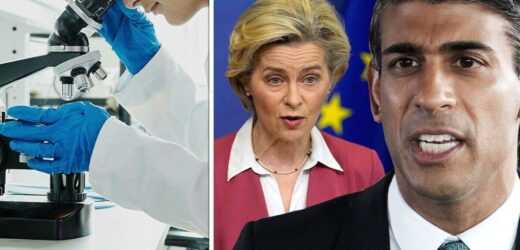Lord Frost gives update on UK’s participation in Horizon Europe
We use your sign-up to provide content in ways you’ve consented to and to improve our understanding of you. This may include adverts from us and 3rd parties based on our understanding. You can unsubscribe at any time. More info
The Government needs to harness its Brexit freedoms to strengthen the UK’s science sector if it is to avoid a serious brain drain, Express.co.uk has been told. This week marked the third anniversary of Brexit, which many argued could open the door for Britain to take control and harness growth in its research and development sector. But instead, Express.co.uk understands that Britain is facing “brain drain” as researchers begin to look for work elsewhere. Meanwhile, also experts have also warned that European scientists could be less willing to take an interest in the UK.
Perhaps the most blatant marker of how the UK’s tarnished relationship with the EU has had an impact on Britain’s science sector is Britain’s expulsion from Horizon Europe. The £80billion scheme flagship innovation scheme is deemed as being crucial for international collaboration on science. The UK even negotiated to remain part of the project after Brexit as part of the 2020 Trade and Cooperation Agreement.
But the bloc told Britain it cannot rejoin until the Northern Ireland Protocol dispute is resolved. Now, scientists who had access to prestigious EU grants and were ready to form partnerships with European collaborators risk having their funding cut as access to the scheme remains blocked. The UK is pushing to rejoin, but with the dispute having dragging on for over two years, the science community is still stuck in limbo.
Shadow Science Minister Chi Onwurah told Express.co.uk,: “This is the biggest science fund in the world and Brexit has just caused huge uncertainty, which is bad for British science and British business. Many businesses are collaborating with universities using Horizon funding on a huge range of projects from cancer research to the implementation of new discoveries. This is a huge ongoing impact.
“Early career researchers would have benefited from these much-needed grants, and those who have won these grants are unable to take them up in the UK. The uncertainty means the researchers, scientists across the world are probably less keen on coming here.”


Prof James Wilson, a researcher from University College London, agreed that the “prolonged period of uncertainty” is having an impact.
He told Express.co.uk: “There has definitely been a knock to the confidence of European collaborators in the reliability of the UK side as a partner because of all this. It will be overcome in time, but it will take a bit of repairing and effort to stitch it back together. And on the UK side, lots of people have not been putting themselves forward for European funding because of the uncertainties.”
Peter Bruce, Physical Secretary and Vice President of the Royal Society, said he has already noticed interest from potential European collaborators dropping off.
He said:“Brexit has had an impact on the willingness of people from continental Europe to come and work here. I have been in research for longer than I care to admit now, but only over the last few years have I seen a massive drop off in applicants wanting to come and work for my team…It was frictionless before. But now, there are visa issues and a sense of us no longer being part of the same system.

“It is also having an impact on the brain drain. People are having to leave to keep their European grants. What will happen is they won’t come back, even if we go into Horizon. Once they are established there and they have relocated their families, it is unlikely that they will come back.”
This comes after the EU told around 150 UK-based winners of Horizon Europe grants that they can only receive their awards if they move to a country within the bloc, or to one that has Horizon Europe association. Up to 27 researches have already left. However, there are plenty of opportunities for the UK to take advantage of after Brexit, which could strengthen its research sector, Express.co.uk was told.
Mr Bruce noted that the UK’s science base is one of the areas that it is “demonstrably world-class in”, and in which we “punch above our weight”. To build on this, it has been argued that Brexit could give Britain the the opportunity to open up to the rest of the world.
For instance, Prof Wilsdon argued that “the reality of Brexit has forced a fresh drive to generate and increase the volume and intensity of increased collaboration around the world”. He added: “Just look at the agreements on research and development that are being developed with Australia, Japan, New Zealand and Switzerland.
DON’T MISS
Meet the dinosaur given a painstaking makeover 19 years in the making [REPORT]
Energy boss’s 7 word defence as prepayment meters blasted [INSIGHT]
Three point plan to get Russia to ditch its nukes unveiled [REVEAL]

“We have had to go out and be more creative and entrepreneurial in how we look for opportunities to collaborate. That might in time, prove quite positive as it could put us on a different path…because the EU yanks everyone into a similar approach and trajectory in terms of collaboration.”
But according to Ms Onwurah, the UK has been off the pace in delivering on this. She said: “The Government’s emphasis on working with other nations outside the EU could have been more positive, but we haven’t seen enough of that. Its Turning Scheme for example, is not well-funded and the investment in science around the world has been reduced to the cuts of Rishi Sunak’s development aid.”
The Turing Scheme is the Government’s programme for providing funding for international opportunities in education and training across the world.
However, Science Minister George Freeman, who is working on an alternative for Horizon, has been keen to stress that a “Plan B” would involve forming partnerships with other science powerhouses like Japan and the US. He also wants to form multilateral partnerships, with agreements comprising of three, four or five countries.
According to Mr Bruce, the Government “is making progress with this”, but he would like to see it “move faster and further”. He added that we are “not in too many other things, we need to see faster progress in forming agreements with countries outside Europe”.

This can also not be something which wholly replaces Horizon altogether, but needs to work alongside it, Mr Bruce added. The Royal Society Vice President also appreciated Mr Freeman’s visit to Japan last year, where a new science partnership was announced. Meanwhile, Britain also has give the UK the opportunity to slash EU red tape to boost certain areas of research, such as in Artificial Intelligence (AI) or genetically modified crops (GM). However, it was largely agreed that progress in this domain has also been slow.
Ms Onwurah said: “The Tories talk about the Brexit dividends in terms of deregulation in terms of certain areas, but we are yet to see specific areas of deregulation that we can take advantage of.“For example GM crops or AI. With the US investing in climate change and the EU investing in net zero, there are opportunities for us to invest in those areas as well. There is a competitive challenge that we face.”
Mr Bruce agreed that this remains a work in progress, without any major changes seen yet. However he wasn’t sure how big of an impact deregulation could really have on our progress in these areas as these are “global problems”.
He added: “We are not really feeling the benefits yet, maybe that will come in a few year’s time. But at the moment, Brexit is not offering any tangible advantages that I can detect anywhere in the system.”
Prof Wilsdon said that while the positive voices arguing Brexit will benefit the UK science sector are “theoretical”, he was hopeful that we will start to reap the benefits in a few years. He said: “There are real assets in the UK system that aren’t going away. It is a matter of trying to direct those, so the pro-Brexit case can still be made.”
Express.co.uk is reaching out to BEIS for comment.
Source: Read Full Article


